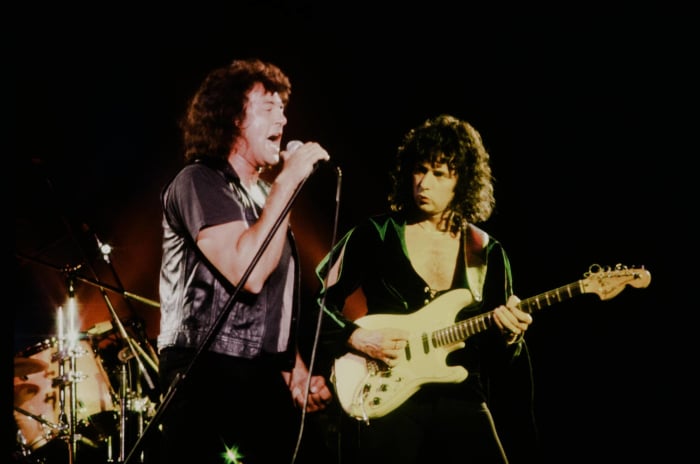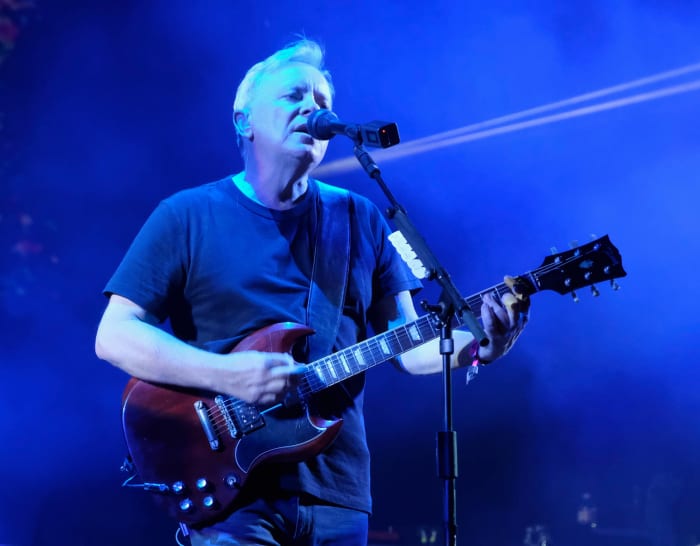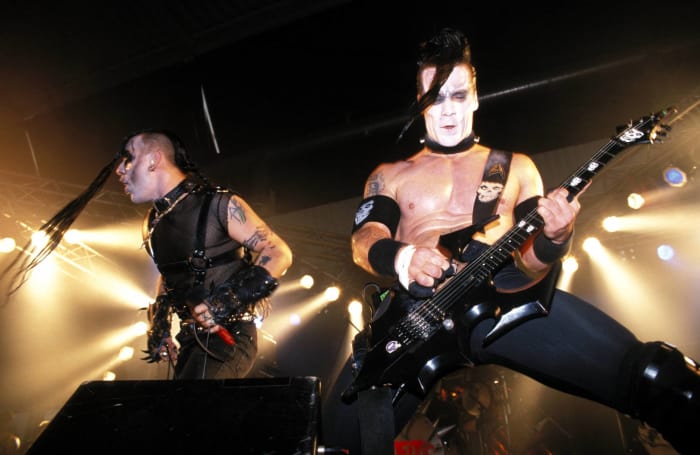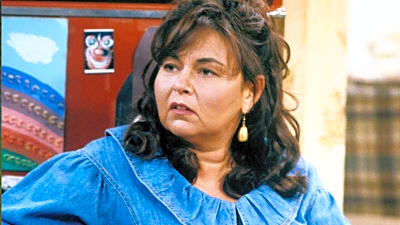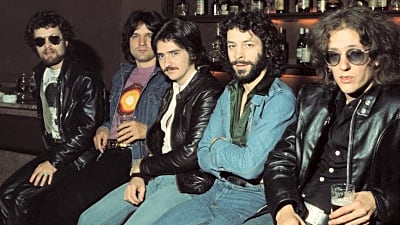After Stone Temple Pilots fired frontman Scott Weiland in 2013, STP faced the difficult decision of moving on without their lead singer, or finding the right voice to carry the torch for the band. They briefly found that voice in Chester Bennington before he decided to devote all of his time with his own band, Linkin Park. The tragic overdose of Weiland in late 2015 and then Bennington's own suicide in 2017 meant STP could never hope to reunite with either of its former vocalists, casting a long shadow over finding the right voice for Stone Temple Pilots. As guitarist Dean DeLeo put it, "There was no room for error."
Fortunately, DeLeo and the rest of Stone Temple Pilots have found their new singer in Jeff Gutt. DeLeo recently opened up about the process, saying, "... we spent nearly a year together with Jeff before we invited him to join the band. We wanted to make sure it was the right decision. But we did find somebody who could not only do the catalog of our previous songs justice, but someone we could write new songs with, too."
With STP's first LP in eight years due out and a new tour starting, Stone Temple Pilots are continuing one of rock's greatest traditions: moving on. Here are 23 other bands who have found success behind a new vocalist.
Koh Hasebe/Shinko Music/Getty Images
The initial incarnation of Deep Purple featured Rod Evans as the lead singer and had reached some success in the charts with a cover of Joe South's "Hush." The British band didn't move on to the next level until Evans was replaced by Ian Gillan, whose vocals in songs like "Smoke on the Water" and "Space Truckin'" would help cement the band's place as one of the forefathers of metal.
Michael Ochs Archives/Getty Images
When Pink Floyd released their first album, "Piper at the Gates of Dawn," in 1967, Syd Barrett was the band's lead singer. Barrett's tenure fronting the iconic prog rock band didn't last, however. He left in early 1968 because of mental health issues. Roger Waters, the bassist, would assume lead vocals and songwriting duties. Under Waters, Pink Floyd made "Dark Side of the Moon," "Wish You Were Here," and "The Wall" – arguably three of the most important albums in rock history. Waters himself would leave in 1984, leaving guitarist David Gilmour to take the helm.
Paul Natkin/Getty Images
Iron Maiden went through two singers before they found Paul Di'Anno in 1978. A nasty drug habit forced Di'Anno to be kicked out of the band in 1981. The man brought in to replace him, Bruce Dickinson, helped propel the band into mainstream success thanks to songs like "Run to the Hills," "Aces High," and "The Trooper."
Waring Abbott/Getty Images
Since forming in 1981, thrash metal pioneer Anthrax has gone through eight different lead singers. Of these, the two that stand out are Joey Belladonna and John Bush. Under Belladonna, the band put out 1985's "Spreading the Disease" and 1987's "Among the Living." Belladonna was replaced with Bush, who provided lead vocals in 1993's "Sound of White Noise," one of Anthrax's most successful albums to date.
Peter Still/Redferns/Getty Images
The AC/DC you have come to know and love wasn't the first version of the band. In 1974, Bon Scott replaced original singer Dave Evans. The band blew up shortly thereafter thanks to albums like "High Voltage," "Dirty Deeds Done Dirt Cheap," and "Highway to Hell." Scott died tragically in 1980 after choking on his own vomit following a night of heavy drinking. He was replaced by Brian Johnson, who helped the band finish recording 1980's "Back In Black." That record would go on to be the second highest selling album in history, topped only by Michael Jackson's "Thriller." In 2016, health issues forced Johnson to retire and Axl Rose was brought on for the remainder of the tour.
Fin Costello/Redferns/Getty Images
Van Halen has had three different lead singers but only two of them matter (sorry not sorry, Gary Cherone). The band reached success with the first, David Lee Roth, recording classics like "Van Halen" and "1984." Unfortunately, Roth's penchant for showmanship caused tensions between himself and lead guitarist Eddie Van Halen, which led to his departure in 1985. Sammy Hagar came joined in 1986, and provided vocals for "5150," "OU812," "Four Unlawful Carnal Knowledge," and "Balance," all commercial hits for Van Halen. Hagar had such an effect on the band, that people would often refer to the band as Van Hagar (usually meant as a pejorative).
Michael Putland/Getty Images
It took three tries before Journey found the singer that would define their sound. Before Steve Perry joined the band in 1977, Gregg Rolie and Robert Fleischman had brief stints leading the band. It was with Perry that the band recorded "Don't Stop Believin'" in 1981, which is easily one of the top three most ubiquitous songs in the world. Perry left the band in 1996. Since his departure, Journey has had three additional singers – Steve Augeri, Jeff Scott Soto and Arnel Pineda.
Gabriel Grams/Getty Images
From 1987 until 1992, 10,000 Maniacs released three albums that went platinum in the U.S. – "In My Tribe," "Blind Man's Zoo," and "Our Time in Eden." It was in 1991, during the recording of the last of these, that lead singer Natalie Merchant announced that she would be quitting the band in two years time. Sure enough, Merchant left in 1993. The Merchant-less 10,000 Maniacs continued on with Mary Ramsey as a replacement, and even had a single enter the Billboard charts in 1997 – a cover of Roxy Music's "More Than This."
Nigel Crane/Redferns/Getty Images
Though technically a supergroup, the case can be made that Velvet Revolver was the rest of Guns N' Roses moving on without Axl Rose. Velvet Revolver was formed in 2002 by GNR's Slash, Duff McKagan, and Matt Sorum joining forces with Dave Kushner (Wasted Youth's former guitarist) and Scott Weiland (formerly of Stone Temple Pilots). Both of Velvet Revolver's albums (2004's "Contraband" and 2007's "Libertad") entered the Billboard charts, but the band broke up in 2008 after Weiland checked himself into rehab for substance abuse. In 2015, Weiland died of an apparent overdose.
Waring Abbott/Getty Images
Just about every Foreigner song you know – "Hot Blooded," "I Want to Know What Love Is," "Waiting For a Girl Like You" – was sung by Lou Gramm. In 2003, after leaving twice before, Gramm left for good to pursue a career in Christian rock. In 2005, Kelly Hansen joined the band, lending vocals to Foreigner's 2009 album, "Can't Slow Down," which charted worldwide and even went gold in Europe.
KMazur/WireImage/Getty Images
Audioslave formed after Zack de la Rocha left Rage Against the Machine in 2000. Legendary producer Rick Rubin brought the remaining band members – Tom Morello, Tim Commerford, and Brad Wilk – together with Chris Cornell, the ex-lead singer of Soundgarden in 2001. The supergroup put out three great albums (2002's "Audioslave," 2005's "Out of Exile," and 2006's "Revelations") before Cornell left in 2007 because of financial disagreements.
12 of 23
Prophets Of Rage
Kevin Winter/Getty Images
After nearly a decade since Audioslave broke up, the ex-members of Rage Against the Machine – Morello, Commerford, and Wilk – formed yet another supergroup in 2016, this time joining forces with Chuck D, DJ Lord (both of Public Enemy) and B-Real (of Cypress Hill). The band just released their eponymous debut album in September 2017.
Ebet Roberts/Redferns/Getty Images
Alice in Chains was one of the most important bands of the Seattle grunge movement thank to the tortured but brilliant vocals of Layne Staley (check out "Man in the Box," "I Stay Away," and "Grind"). Alice in Chains was active until around 1996, when the band had to go on hiatus after Layne Staley nearly died of a heroine overdose. Staley was pretty much a recluse until his death in 2002. In 2005, Alice in Chains started played several reunion shows, and the next year, William DuVall joined the band full time. Alice in Chains has put out two albums during the DuVall era, "Black Gives Way to Blue" (2009) and "The Devil Put Dinosaurs Here" (2013). Both albums were nominated for Grammys.
Jim Steinfeldt/Michael Ochs Archives/Getty Images
When you think of Henry Rollins, one of the first things that comes to mind is that he was the lead singer of Black Flag. But Rollins wasn't the hardcore band's first frontman. Keith Morris, Ron Reyes, and Dez Cadena provided vocals between when the band first formed (1976) and Rollins first joined (1981).
Jonathan Leibson/Getty Images for Bethesda Softworks LLC
Though both Mark Hoppus and Tom DeLonge split lead vocals duty, DeLonge sang a higher share of the pop punk band's catalog. DeLonge left the band for good in 2015 to pursue other non-musical interests, and Matt Skibba of Alkaline Trio was brought in to replace him. A year later, Blink-182 put out "California," a commercially successful and critically acclaimed record that received a Grammy nomination for "Best Rock Album."
Ian Dickson/Redferns/Getty Images
Alternative rock band Blind Melon had decent success in the early 1990s. Their 1993 single, "No Rain" received a lot of airplay on MTV, guaranteeing the band a massive worldwide audience. It wouldn't last. In 1995, lead singer Shannon Hoon died of a cocaine-induced heart attack. The band released "Nico," their third album, posthumously in 1996, and called it quits in 1999. They reformed again in 2006 with Travis Warren as their singer, and even put out a new album in 2008, "For My Friends."
Kevin Winter/Getty Images
The New Cars happened because Elliot Easton and Greg Hawkes wanted to keep touring and lead singer Ric Ocasek did not. In 2005, with Ocasek's blessing, Easton and Hawkes kicked off The New Cars, a band that featured Todd Rundgren as the lead singer, performing mostly songs from the original band's extensive catalog – "Just What I Needed," "You Might Think," and "My Best Friend's Girl," just to name a few. This configuration didn't last long and the band called it quits in 2007.
Frazer Harrison/Getty Images for Coachella
New Order formed from the ashes of post-punk/proto-goth band Joy Division, which dissolved in 1980 after lead singer Ian Curtis committed suicide. The remaining members of Joy Division – Bernard Sumner, Peter Hook, and Stephen Morris – would outgrow the shadow cast by their previous band thanks to hit records like "Power, Corruption & Lies" and "Technique." Hook would later leave New Order in 2011, and the band and their former mate would finally settle their legal fighting in 2017.
The band has played Coachella a couple of times in recent years – now even their children are old enough to want to join them.
Mick Hutson/Redferns/Getty Images
The incarnation of Misfits that people are most familiar has Glenn Danzig as the band's lead singer. Danzig quit Misfits in 1983, effectively putting the band on ice for more than a decade. In 1995, however, Danzig reached a negotiation with ex-band members Jerry Only and Doyle Wolfgang von Frankenstein that allowed the siblings to use the rights and imagery of the band. The post-Danzig Misfits were more heavy metal and had Michael Graves as the lead singer. This version of the band put out 1997's "American Psycho" and 1999's "Famous Monsters" before going on hiatus in 2000.
Ebet Roberts/Redferns/Getty Images
Similar to The New Cars, The Heads formed because the majority of a band wanted to continue touring and making music but their lead singer didn't. In 1996, the remaining band members reformed as The Heads, and enlisted a group of famous singers to replace David Byrne on vocals – including Blondie's Debbie Harry and Michael Hutchence of INXS – for their album "No Talking, Just Head." Unlike Ocasek, Byrne wasn't so keen on having his ex-bandmates use a variation of the original band name, so he sued them, eventually settling out of court.
21 of 23
The Velvet Underground
Gijsbert Hanekroot/Redferns/Getty Images
It's hard to imagine that a version of the Velvet Underground without Lou Reed ever existed, but it's true. Reed left the band in August of 1970, before the release of "Loaded" (an album which he takes credit for, at one point saying that he "left them to their album full of hits that [he made]."). Doug Yule, who replaced the multi-instrumentalist John Cale when he left in 1968, took over lead vocals, and the band put out "Squeeze" in 1973 before breaking up for good.
Peter Still/Redferns/Getty Images
Black Sabbath were heavy metal pioneers thanks in large part to their lead singer Ozzy Osbourne. It was with Osbourne that they recorded "Black Sabbath," "Paranoid," and "Master Of Reality," three albums that shaped the genre. But Black Sabbath was more than just Ozzy Osbourne. This was proven to be true when he was kicked out of the band in 1979 because of his drinking and was replaced by Ronnie James Dio, a heavy metal legend in his own right. With Dio at the helm, Black Sabbath made "Heaven and Hell" and "Mob Rule," which went platinum and gold in the U.S., respectively.
Michael Putland/Getty Images
Most often than not, a lead singer leaving can be a death blow to a band. That's not always the case, though. Sometimes, a band member stepping up to the plate can be the best thing to ever happen to the group. That's what happened when Peter Gabriel left Genesis in 1975 to pursue a solo career and drummer Phil Collins took over lead locals. The Collins-led Genesis was one of the most successful acts of the 1980s and 1990s until Collins himself decided to leave in 1996 to – yep, you guessed it – focus on his solo career.

 +
+
